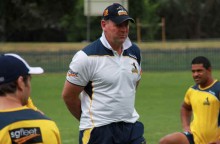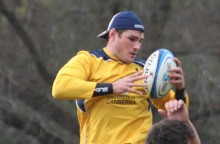Scheduled Website Maintenance
We’re currently in the process of moving to a new and improved server environment. During this transition, the website may experience brief interruptions or temporary outages.
We appreciate your patience while we complete this upgrade. Service will return to normal shortly, with improved performance and reliability.
Thank you for your understanding.
Were the Brumbies a success or a failure in 2012? It depends whom you ask as to what response you’ll get.
Brumbies coach Jake White is calling it a failure, considering where they were as they went into the last round with their finals destiny as in their own hands, before they inexplicably froze up against the lowly Blues.
But to the regular fan, the answer could be somewhat different. Twelve months ago the team were coming off their worst season ever and were in turmoil. The 2011 season saw the starting coach Andy Friend sacked after just two games with whispers of a ‘player power’ revolt. Then, after they lost to the Lions at home, interim coach Tony Rea unleashed an almighty spray that still rings through the organisation.

Almost one year to the day ago, World Cup-winning coach Jake White arrived in Canberra and immediately began to shake things up. He brought back former Brumbies head coach Laurie Fisher as forwards coach and stuck with Steve Larkham to look after the backs.
It could easily be forgotten that this was White’s first gig in charge of a provincial side after previous stints as coach of the Springboks and the South African Under 21 side.
White then went on a recruiting spree that saw some of the best young talent across Australia and few journeymen brought it to replace the high number of experienced players moving on.
He then brought in renowned conditioner Dean Benton to oversee the athletic performance side of things and with that, started to sow the seeds for the 2012 campaign with a series of camps held in Sydney to prepare the largely inexperienced players for the rigours of Super Rugby.
A number of fans started to wonder who these new players were. Jake White has won a World Cup so it would be difficult to question his judgement in this area. Considering the Brumbies started the season with only three Wallabies in the whole squad — Ben Alexander, Stephen Moore and Pat McCabe — some thought the Brumbies would only be making up the numbers in 2012.

He made what many thought to be a bold decision to install new recruit Ben Mowen as captain ahead of the experienced Stephen Moore, but this move proved a master stroke as the young side went about their pre-season work.
White and his players then got stuck into the season and started it with a lineup boasting the lowest ever number of Super caps to take on the Western Force. They got the season off to a winning start, although the nerves were evident for both players and the coach.
A narrow after-the-siren win against the Cheetahs was followed by a close loss to the Chiefs in a match that few expected them to be competitive in. It was at this point that outsiders began to take notice of the side.
Another close win at home over the Highlanders was followed by close losses to the Sharks and Reds. But then came one of the highlights of the season.
A three-week period saw tries scored at a rate of knots, with 16 coming in three games. Two of those games came on the tour of South Africa that yielded seven competition points from a close loss to the Bulls (thanks, Marius) and a win over the Lions.
The name Fotu Auelua was being notes by many after his impressive run on the tour of South Africa. After arriving late in the pre-season from Japan he was finally unleashed and his damaging runs and tackles resembled a game of human ten-pin bowling at times.
The Brumbies were starting to settle on their best XV after White initially rotated the squad and the results were becoming less of a surprise and more of an expectation. Some of the unknowns were making names for themselves.
Throughout the season they were largely unaffected by injuries but a season-ending knee injury to fly-half Matt Toomua against the Sharks was followed by the cruel ankle injury to Toomua’s backup Christian Lealiifano in the last-play in the win over the Waratahs in Canberra that ended his Wallabies aspirations for 2012.
The playmaker duties then fell to former Sevens player Zack Holmes, and many thought it could be the end of the fairytale.
But the young side armed with a simple game plan and a never-say-die attitude then went to Wellington, where the Brumbies had not won since 2003. They left with a bonus point win after Holmes had an outstanding match.
The pressure appeared to get the better of them though, as the Reds knocked them off for the second time in 2012 with Holmes missing a chance to snatch an unlikely win after the siren.
The mid-season break allowed the players to refresh after being on the go since July last year. They resumed the season with a bonus-point win over the Force in Perth and followed that with a gutsy win over the Waratahs in Sydney, to record their second-ever win there and the first since 2002.
Then, with their finals destiny in their own hands, they needed to score only one competition point against the struggling Blues side — but for some reason suffered a bad case of stage fright and went down by a mile, to open the door for the Reds to snatch the Australian Conference at the death.
Perhaps it was inexperience that cost them a finals berth, but in 2012 they showed they were prepared to have a go — and the only way to gain experience is to play games at this level.
It would be tough to judge the season on just one game. Up until that Blues game their biggest loss was just seven points, and that record helped them collect crucial bonus points along the way.
Some would argue that they didn’t deserve to make the finals since they didn’t play the Crusaders or Stormers, but the players don’t make the draw; they just play the cards that are dealt to them.
Overall the Brumbies scored 41 tries that aided them in scoring a match average of 25 points while conceding 20. Other stats of note showed the Brumbies relying on their superior fitness to close out games with a high level of possession in the second half.
They also showed they were prepared to kick the ball often and rely on their defence to absorb pressure and wait for mistakes. A feature of the kicking game was halfback Nic White’s ability to gain valuable field position.
In the end the Brumbies ended up with more Wallabies squad members than many expected. In addition to the three already on the books, Dan Palmer, Michael Hooper, Ben Mowen, Nic White, Joe Tomane and Jesse Mogg all got a chance to be part of the Wallabies setup, and that experience will be invaluable going into 2013.
The key now is to build on the results of 2012 and move into 2013 with the same attitude. Other teams will also start to take notice of them.
For the record, I say the season was a success.
[one_third last=”no”]
Best game:
For me, the win in Wellington ranks as the best win. Having not won there since 2003 and going in with a rookie fly-half it looked a tough game, especially when they fell behind. But a strong second half saw them get the win.[/one_third]
[one_third last=”no”]
Worst game:
The Brumbies saved their worst effort for last in the loss against the Auckland Blues. Before that one, the Reds game in Queensland was the most disappointing. The game was lost at the breakdown when Michael Hooper started from the bench and it appeared the Brumbies were off the pace in that area.[/one_third]
[one_third last=”yes”]
Find of the year:
With many new players on the books there were plenty to choose from but Scott Fardy was a standout. A journeyman who couldn’t get a start with the Western Force then ended up in Japan before taking a chance with the Brumbies, Fardy ended up playing the majority of the season in the second row with Sam Carter, and was unlucky to not get a call from Robbie Deans for further honours in 2012.[/one_third]
Stats courtesy of Ruckin Good Stats
